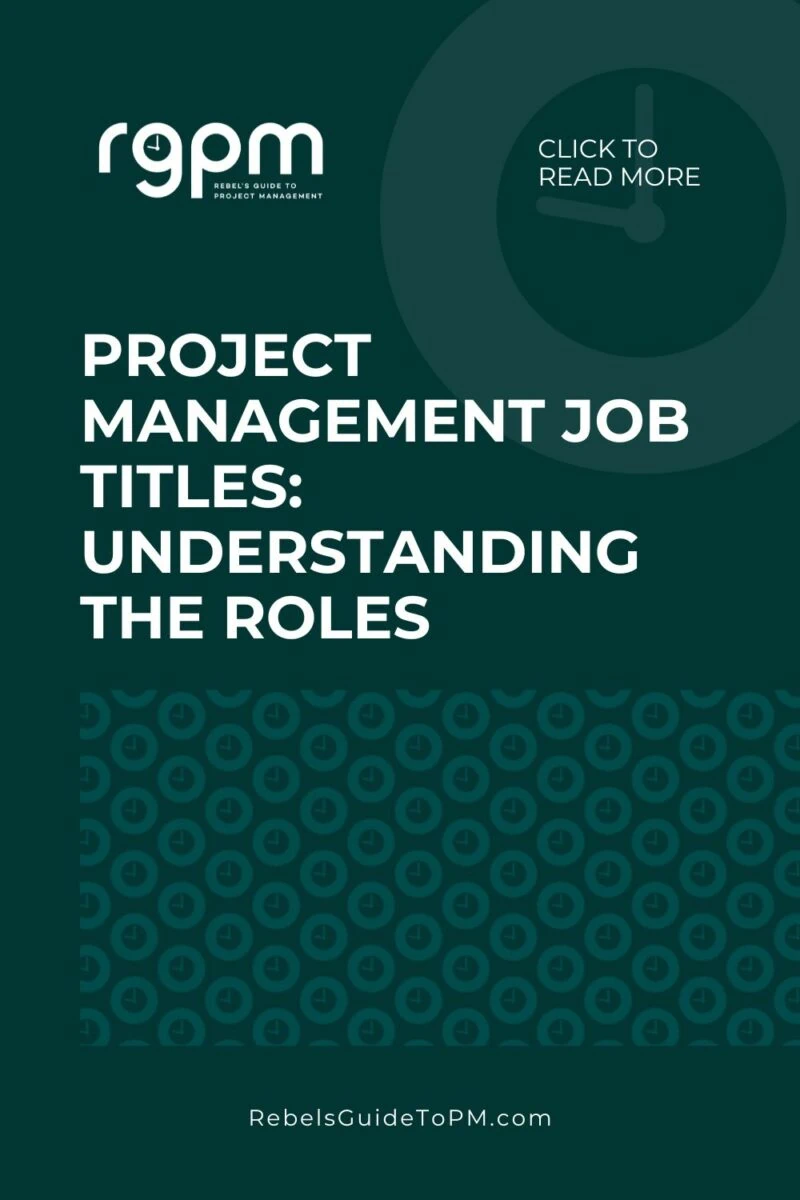Project Management Job Titles: Understanding the Types of Roles in Project Management
This blog is reader-supported. When you purchase something through an affiliate link on this site, I may earn some coffee money. Thanks! Learn more.
If you’re searching for a project management job, you’ve no doubt come across a range of different job titles. Which one should you go for? The ‘project manager’ job descriptions have a wide variety of roles and duties, which can make it hard to know what’s right for you.
And therein lies the challenge.
What ‘project manager’ means to one business will be slightly different to how another company uses the term.
There are some industry-recognized job titles — the ones you’ll most commonly see. In this article, we’ll go through what they mean and what you can expect to do in one of those roles.
Project managers work on things that have a beginning, a middle and an end, with a defined end result. That’s what a project is.
These days, many people do the role of a project manager without having the job title. So many jobs have an aspect of being able to manage projects as part of what the person is supposed to do.
However, in this article, we’re focusing on people who predominately manage projects. In other words, people for whom project management is their main daily focus.
Different types of project manager
While the core skills of being a project manager remain the same, industry insiders often think of there being different types of project manager. The most common way of defining different types of project manager is by industry. For example:
A Digital Project Manager will
oversee projects to do with online initiatives, digital marketing, software,
apps and so on. They may mainly work with
An IT Project Manager is — unsurprisingly — based in the IT department of an organization. They work on technical projects, which could be software, application, platform, infrastructure, security, or projects that bring together subject matter experts in all IT disciplines to deliver something. (Also known as a Technical Project Manager.)
A Construction Project Manager is a specialist working in the construction field. They have an understanding of design and build, and often have to manage a lot of suppliers to complete the finished project.
A Legal Project Manager supports legal teams to deliver either process improvements and internally-facing work, or legal projects for clients. This role tends to require a legal background and training.
In fact, most industries have project managers. You’ll find job titles such as Engineering Project Manager, Marketing Project Manager, Publishing Project Manager, Healthcare Project Manager (like me) and more.
Basically, all that means is the project management role is specialized in a particular industry. Agile marketing, for example, is a specialist way to apply
What that means for you is that you can choose an industry that excites and interests you. Whether you love retail or catering, tech or medicine, there will be a project management job in that field.
Alternative names for project managers
If your organization doesn’t use the job title ‘project manager’ then maybe you’ll find yourself being called something else that basically means the same thing:
- Delivery manager
- Implementation manager
- Project lead
- Execution manager
- Associate project manager (tends to be a more junior project manager, but often higher than entry-level)
- Project leader (tends to be a more senior position)
- Change analyst/change manager (while change manager is a distinct role, I know some organizations use the title to mean project manager)
All these roles could lead a project management team — there is a huge range of project management positions!
Specific domain jobs for project managers
Fancy specializing? You absolutely can. Here are some roles to look out for that allow you to focus on the bits of project management you really love.
- Project Quality Manager
- Project Scheduler (often found in the construction industry or engineering)
- Project Risk Manager
If you love
Entry level project management job titles
If you don’t yet have the project management certification and experience to go into a project manager job, you’ll be looking for job titles for entry level positions.
Here are some example entry level project management positions to watch out for.
Project Administrator
This is a very common entry-level position. You work on one project, supporting the rest of the project team with mainly administrative tasks.
The project administrator we had on one of my projects was brilliant. He managed all the logistics for the project including booking rooms for testing and training, making sure the right delegates showed up to the training, supporting them with claiming expenses, organizing project boards, steering groups and other governance milestones, and generally making everyone’s lives easier.
He learned a lot about project management in the process and eventually went on to become a PMO Manager.

Project Coordinator
This is a similar role to the Project Administrator, but people with this job title are more likely to do ‘hands on’ project work as well as admin.
It’s often a first step role for people wanting a career in project management.
Project Support Officer/Specialist
We see this job title used in the public sector. It’s similar to the Project Coordinator. It’s a job where you assist the project manager with whatever needs to be done.
Project Controller
If you want an entry level job in heavy industry like engineering, construction, then look for this job title. It’s often a hybrid role between Co-ordinator and someone who focuses purely on project planning.
A Project Controls Specialist or Manager is a more senior role, focusing on making sure projects deliver to the required standards.
Document Controller
If paperwork is your thing, this is the job for you! A document controller is responsible for filing, managing and looking after all the project documentation.
These days, that’s going to involve a lot of electronic filing and version control, but also managing ‘wet signature’ contracts and other signed materials.
Project Expediter
A project expediter is someone who supports with procurement. They place orders, receipt in deliveries, manage invoices, chase up queries and talk to suppliers.
If your project or program has a lot of kit that needs ordering, having someone full-time (or part-time allocated in this role is a good idea). And if you’re keen to work on large projects in a slightly Finance-y role, then this could be a good job for you.
What position is higher than a project manager?
If you already have the project manager job title, look for positions the next level up. These include:
Senior Project Manager
A senior project manager is someone with more experience and/or responsibility than an ‘ordinary’ project manager. If your company has job families, you should be able to see what it takes to get promoted into a senior PM role.
In this job, you will either have responsibility for one large project, or multiple projects, and you might have project managers and other team members reporting directly to you.
Project Lead/Director
This is another job title I’ve seen that covers the role of a senior manager working to support a project. They are not a ‘hands on’ project manager, but they are kind of a day-to-day working sponsor, embedded in the project team.
This role is a core decision-making function and sets the direction for the project. It’s often someone with product/deliverable expertise instead of someone who has come up through the project management career path.
Program Manager/Director
A program manager oversees a program of work, or sometimes more than one program. This job title might have project managers reporting in to it, or analysts, or other roles. They manage a collection of projects.
Once you’ve got some program manager experience, you could move into a Senior Program Manager role, or a Program Director role.
Portfolio Manager/Director
A portfolio manager is a senior leadership position in an organization, overseeing an entire portfolio of change projects.
Typically, they work across the whole organization, but in a large organization you might have an IT Portfolio, or a Marketing Portfolio, for example. These would be overseen by the portfolio manager.
In that structure, the business would probably have an Enterprise Portfolio Office, where someone pulls all the different portfolios together so the very senior managers can have a complete view of the change happening across the business.
Project Management Office job titles
There’s another whole area of project management: the Project Management Office. These are not delivery roles. Instead, people with PMO job titles are in a crucial support function. Here are some common job titles you’ll find within the PMO.
Project Office Co-ordinator
This is a generic title for someone in an entry level position working in a Project Office supporting projects. They may do reporting, data analysis and other admin tasks.
Program Office Co-ordinator
This role is similar to the Project Office Co-ordinator, expect they are supporting a program instead of a project office.
PMO Analyst
This is another relatively junior job title, for someone who works in a PMO. The role will include a range of tasks, depending on the type of PMO.
PMO Specialist/Lead
If you are particularly skilled in a project management area, you might see this job title. It is for people who have a specialist subject matter expertise like planning, risk, law etc.
Only larger PMOs will have specialists — most of the PMOs I am aware of have generalist resources, drawing in experts from the rest of the organization as required. Other job titles might mention the specialism e.g. Project Planner.
PMO Manager
A PMO Manager is the person who leads the PMO team and is responsible for the PMO lifecycle.
They are responsible for creating a PMO mission statement and making sure that the organization’s goals are met through the delivery and balance of all the projects.
They also set and lead on the project management methodologies in use across the organization, although the actual updating of templates and policies could be delegated to someone in the team.
What do the different project management roles do?
Above we’ve seen the different project management job titles and I’ve given a very brief overview of what the jobs entail.
When you apply for a job, be sure to ask for the job description and person specification to give you a clearer idea about what to expect in the role.
For a more general overview of the different career paths for project managers, I love the UK Government’s Project Delivery Capability Framework. While it’s aimed specifically at public sector project managers, it goes into more detail about what jobs at different levels are responsible for.
Even if you don’t want a public sector job, you’ll be able to learn a lot about what different project management job levels are out there.
Even with all the differences discussed, what the roles do have in common is project scheduling software – regardless of the industry or position level, every one of them uses something!
Pin for later reading:

